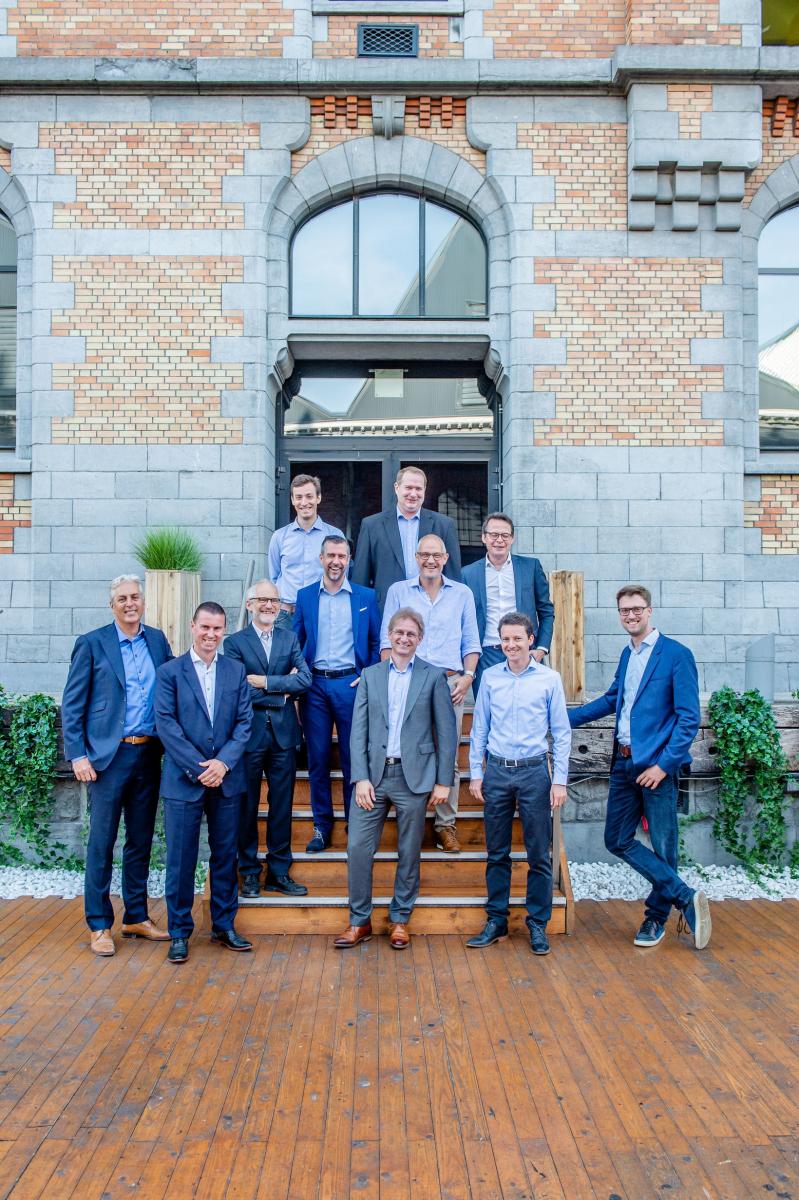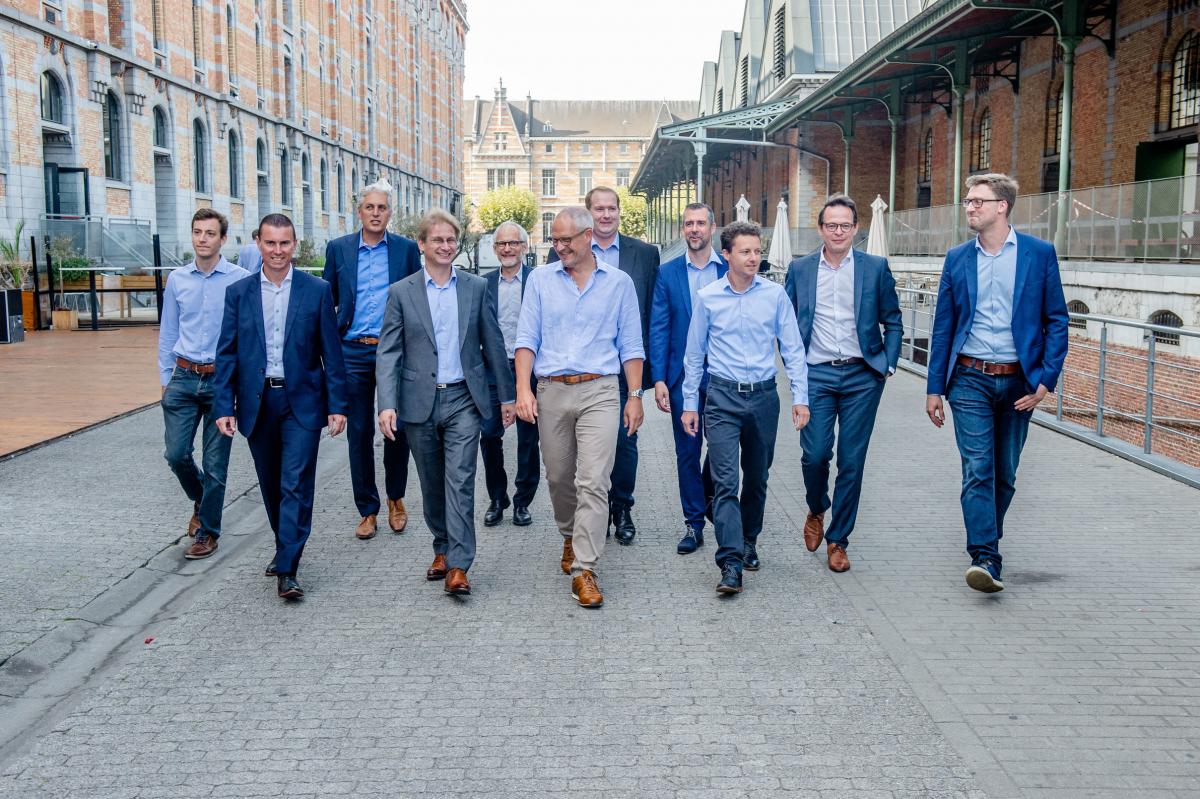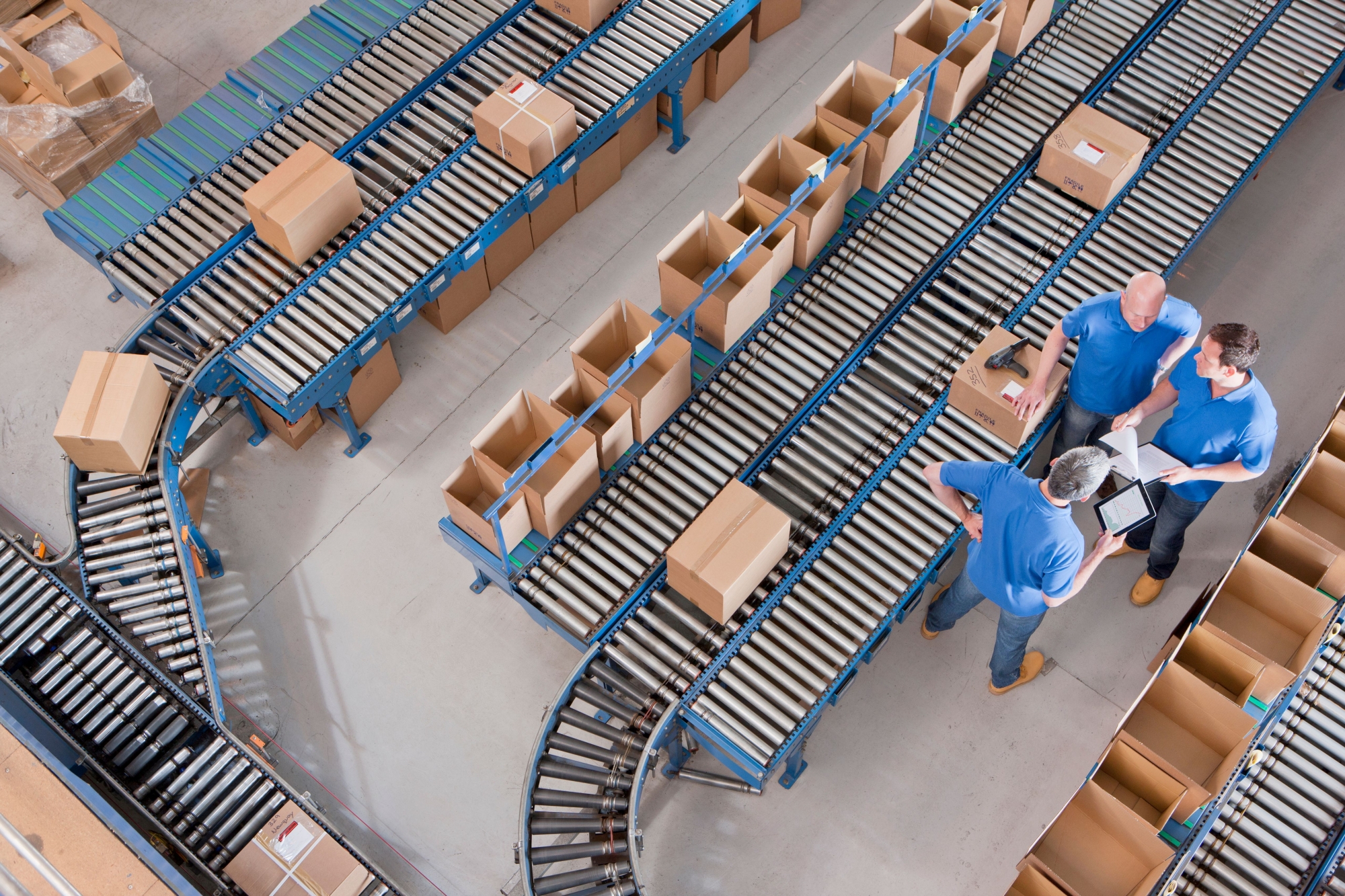How do companies best get started with Industry 4.0?
Paul Peeters: "First of all, it is important for companies to get the basics right. They should therefore first scrutinise their processes. After all, there is no point in automating bad processes. In addition, Industry 4.0 includes an incredible number of tools and solutions. However, it is not about those solutions, but about achieving your business goals. So it comes down to first deciding what those objectives are, then examining what core skills are needed to achieve them, and only then looking at what concrete tools and solutions can serve that purpose. For an efficient application of Industry 4.0, it is best for a company not to skip any of these steps."
Jelle Koning: "Indeed, companies should not focus too hard on the Industry 4.0 story. After all, their place in the chain will continue to change. Companies will have to be 'agile'. The (ERP) suppliers will have to fit in with that. They will also have to find the tools to ensure that agility."
Sam Schellekens: "Industry 4.0 is a broad concept. When choosing a well-defined solution, it is important that the company does not strive to get everything perfect from the start. After all, technology is evolving extremely quickly, so there are plenty of opportunities during the project to make adjustments. Putting too much effort into achieving perfection for too long therefore basically means that one will be running behind the times. After all, by the time the solution is finally finished, newer technology will already be available."
Adriaan Van Horenbeek: "Our advice to clients is always 'find fast or fail fast'. If you find value fast, that's positive and you can scale. If not, it stops there and you move on to the next potential use case."
Thierry Van Eeckhout: "There is no order number '4.0'. So it is not a standard product or service that you can find in a catalogue. It is therefore important for companies to approach it holistically, starting from their own maturity and goals."
Timothy Van Audenaerde: "Almost every major company has already tried the use cases available today (e.g. drones, virtual reality, 3D printing). So most companies are definitely working on it. However, it also comes down to scaling it up, and this is forgotten by many. After all, you won't make a business case with one drone or 3D printer."
Tim Waegeman: "However, to mitigate the risks, companies are introducing it quite gradually. Nor is it the case that one application that provides an efficiency gain for one company will do the same for another. A lot depends on the culture and the employees involved. So it comes down to identifying those processes where the biggest gains can be made. That is where you can then prove the added value in a 'proof of concept' phase."
Steven Stokmans: "Of course, as a company, you have to start somewhere. That's how Tetrapak came under pressure. Traditionally, they sold packaging and the associated production lines. However, the patent on their packaging was about to expire. So they completely transformed themselves into a company that provides packaging as a service, remotely monitoring and preventively maintaining the production lines. In doing so, they started small, and then expanded that further throughout the company based on the successes."
Jelle Koning: "Small companies in the manufacturing industry have few chances to fail. After all, they have few resources to invest in them. So it poses a challenge for our industry to unburden them and provide them with tools they can use to get started."
Walter Auwers: "Industry 4.0 is a revolution where you can go tremendously far, but that should not deter companies from taking the plunge. After all, it is also an evolution."
Tom Van der Straeten (Stanwick): "It also comes down to vision. The market is known in the current context, but not in the future context. So many opportunities are not visible today."
Jelle Koning: "The benefits of minor optimisations (e.g. machines running faster) are no longer enough. Companies can only strengthen their competitive position by integrating machines higher and lower in the chain as well."
What vision is needed for this?
Tim Waegeman: "It is especially important that companies have a drive to make themselves more efficient. Usually this is fuelled by a business case, but there should also be a constant drive on the shop floor to move the company in that direction. Gradually, one will then always get additional ideas and insights on how new processes and solutions can bring an economic benefit."
Jelle Koning: "'Agility' is the key word here. Companies need to be constantly on the move. They have to start somewhere, of course, and then build on that step by step."
Sam Schellekens: "Moreover, it is about how a company can become more efficient without sacrificing quality. Optimisation and efficiency are certainly important, but improving and expanding customer service is also a crucial aspect. This can be done by proactively offering the right solutions based on all kinds of data."
Steven Stokmans: "Flexibility in service delivery will definitely become a key value-added feature. Mass production is giving way to mass personalisation. Customers are becoming more and more demanding, requiring companies to tailor more to their customers' needs."
Paul Peeters: "I would put it even more extreme. There are many companies in Belgium that - if they don't go along with this evolution - seriously jeopardise their survival. It is Agoria's mission not only to warn Belgian companies about this, but also to support them in that process of change. The 'Factory of the Future' programme is already designed to anchor the manufacturing industry in Belgium through innovation."

Are there any examples that show what the possibilities are?
Thierry Van Eeckhout:"We need to move from offshoring to reshoring. The manufacturing industry must return to Belgium. A good example is Adidas, which has reopened a factory in Germany, making personalised sports shoes."
Timothy Van Audenaerde: "Industry 4.0 is still too often only about cost savings and increased efficiency. However, the holy grail is generating additional revenue based on new technologies. There is the example of Caterpillar. They are betting on preventive maintenance via sensors in those machines, in addition to selling heavy machinery."
Walter Auwers: "Moreover, it can be a response by SMEs to the ever-increasing competition from giants such as Amazon, Bol.com and Alibaba. After all, these are not able to offer fully personalised products, while that is just what is possible for small companies betting on Industry 4.0."
Adriaan Van Horenbeek: "We are currently doing a project at a medium-sized company on process optimisation at their own installations. They continue to sell a piece of the knowledge about those installations to other parties. Now they are looking at how they can also take that knowledge directly to improve service to their customers."
Timothy Van Audenaerde: "Some of our customers use social media input to know what is important to their customers. So based on such feedback loops, they can improve their processes and products."
Tim Waegeman: "A customer of ours made products that were too robust, so they couldn't attach a support contract to them. In the end, they decided to turn everything around. Now they give their products to customers for free. They equip these products with sensors so that they can put the monitoring into an annually payable SaaS licence. As a result, the company is once again experiencing strong growth."
Tom Van der Straeten (Stanwick): "Another example is that of drawer manufacturer Van Hoecke, a 'Factory of the Future'. They regularly change their business model and are always looking for new applications. Their end goal is to completely unburden their customers. They do this by completely removing complexity and accommodating it in their processes."
Leo Van de Loock: "Besides the big companies, there are plenty of examples of small businesses that can inspire others."
Sam Schellekens: "The government is doing well in that respect. For example, it has set up several platforms around innovation where large and small companies find each other. Indeed, as a result, there are already many examples of small innovative companies. Any small company that wants to innovate and invest in Industry 4.0 can even count on the support of larger companies to work out innovative ideas together."
How do we get all employees to participate in this transition?
Paul Peeters: "We are in the middle of a 'war for talent'. Companies are not finding enough people, especially for the technical jobs where experience is an important factor. That way, these companies are missing out on some turnover. Moreover, older workers are gradually leaving the company. So their knowledge and experience accumulated over the years need to be captured somehow. A digital (robot) assistant could be a solution to this. However, this is not a threat that can take away jobs as some still think, but a way of taking over some of the work. This will allow workers to get to work more easily and correctly, giving them more time to fuel their own creativity and intrapreneurship."
Steven Stokmans: "Engie already uses such an application. Via Hololens 3D glasses, young employees can be remotely assisted by more experienced colleagues."
Thierry Van Eeckhout: "Digitalisation makes work more intuitive. It allows people to perform multiple tasks regardless of their experience. For example, the number of workers in our digital factory in Amberg has remained the same, but productivity has increased tenfold. Moreover, workers there perceive that the quality of their work has greatly improved because their job is now more varied."
Jelle Koning: "Moreover, because digitalisation makes work more intuitive, companies will also be able to attract people without the experience that would have been needed for the job in the past. In that way, too, it is an answer to the 'war for talent'."
Sam Schellekens: "Unfortunately, too many companies still forget to adequately inform their staff about the changes that are coming and what positive impact they will have. Many employees thus mistakenly think that technology will take their jobs, so they will not embrace the change. This while it has since been proven that technology creates far more jobs than it eliminates."
Tom Van der Straeten (Stanwick): "Resistance is a consequence of the threat that Industry 4.0 is to existing jobs and the status people have. Resistance is necessary in a change process. Let's embrace that too and guide people through that process of resistance."
Walter Auwers: “Among the winners of the 'Factory of the Future' award, the workforce increased by around 10%, while in the technology industry it decreased by an average of 4-5%. So companies with a strong commitment to digitalisation and automation are just better at keeping their people. This shows that it need not be a threat by any means."
Tim Waegeman: "The doubts many have about it are often also caused by the way the technology is introduced. For example, a new robot at a car manufacturer was not initially received very positively because people were used to a certain way of working. So all change is basically detrimental to them, unless it also has a benefit for them (e.g. more comfort, freedom or variety in their job). So it comes down to informing employees about this. You can't just explain to them that it will provide more efficiency, for example, because that is mainly beneficial to management."
Steven Stokmans: "As a company, you need to create the right environment for innovation. A culture where failure is sometimes also an option and where people are encouraged to learn."
Paul Peeters: "One aspect that certainly helps to get employees on board with the transition is the important fact that, as a consumer, every employee now expects that when something is ordered online, it will be delivered the very next day. This also immediately means that they have to accept that this will also apply to the manufacturing industry in the foreseeable future."
Tim Waegeman: “In the integration phase, there can still be a lot of bugs. If employees are involved by then, it creates a perception that it will not work well. So companies should test it thoroughly first to avoid that internal resistance. Employees are not test engineers."
Sam Schellekens: “I agree that a new technology should be introduced gradually. Nevertheless, employees should somehow be warmed up from before integration so that they are ready and receptive to it at the time."
Thierry Van Eeckhout: "If the benefit is felt quickly, that is an opportunity to indeed involve them as early as possible. After all, Industry 4.0 is about a complete business transformation where the ideal status will never be reached. Rather, it is a continuous improvement process. If there is too much fear, the company will never be able to take the step."
Adriaan Van Horenbeek: "Industry 4.0 is just about making people work better. People need to get answers to the questions 'what's in it for me' and 'what's the added value for me personally' as soon as possible. After all, only then can you really get them on board."

How important is the role of management?
Timothy Van Audenaerde: "We need to move away from the 'waterfall approach' where targets and associated budgets for the coming years are set from the top down. That way, risk aversion will be higher."
Thierry Van Eeckhout: "Indeed, business leaders who only put their KPIs first will not find enough enthusiasm and cooperation from employees. So they need to better communicate the benefits for those employees."
Jelle Koning: "On the one hand, a genuine commitment has to be created. On the other hand, it is also about showing guts as management. After all, Industry 4.0 involves a whole culture change, while management is just the bearer of that culture."
Walter Auwers: "You don't necessarily have to impose it either. You can also see it as a kind of experiment. By listening to the employees' first impressions and experiences, you can then optimise further. That way, the employees are included in the story and see it gradually come to realisation."
Tim Waegeman: "It seems best then to do this sporadically, and not immediately full-time. After all, many things are still under development and therefore need further adjustment. If you make something operational too soon, frustrations will possibly create an internal barrier among employees."
Sam Schellekens: "Creating commitment can be done in different ways. For example, it can be done by opening up the platform and explaining why the change is needed. Then you can ask if people are interested in participating. That way, a community gradually grows, until the moment almost everyone wants to participate."
Steven Stokmans: "In any case, technology serves to empower people and should be at their service. For this reason, we are betting on artificial intelligence and cognitive services, which allow people to interact naturally with technology. There is also the aspect of workplace safety. There, too, new technologies can add enormous value. In many companies, that reason should even be at the top of the investment priorities."
Timothy Van Audenaerde: "The number of workplace accidents has systematically declined over the past 20 years, but they have stabilised over the past five years. After all, all classic interventions have already been applied. Now only new technologies (e.g. big data, smart cameras, sensors, ...) can provide further improvement."
Tom Van der Straeten (Stanwick): "Commitment to culture must be supported by the organisational structure. However, in many companies this structure is still too pyramid-shaped, requiring too many people to give their approval on certain things. We need to give employees more responsibilities and we should not be afraid to make mistakes. From this you can just learn."
What is the importance of training? And how should they be organised?
Thierry Van Eeckhout: "The question is what we mean by training. In the past, that almost always meant taking lessons at school desks. However, new technologies are often very intuitive, making 'learning on the job' even more important. Digital twins also increase transparency on product, production and performance, which means we always have accurate info."
Steven Stokmans: "Keep on learning is the message. This requires an organisational culture that is committed to lifelong learning and recognises that it is crucial to continue to maintain the collective memory within the organisation."
Timothy Van Audenaerde: "Digitalisation can also help educate people, for example through gamification, instructional videos on YouTube, etc. That way, everything becomes more accessible."
Walter Auwers: "To get Industry 4.0 introduced to themselves and develop with them, companies need profiles that can combine the IT and manufacturing story. Many companies today have integrators assist them instead of putting together their own team. It is then important that these external specialists also know something about manufacturing and the processes of that company."
Tim Waegeman: "The integrators and internal people also need to complement each other in this respect, above all, and form a partnership."
Adriaan Van Horenbeek: "It is also a collaboration across company silos. For instance, we always try to put together a team that includes manufacturing experts from the customer. This is how we make the connection between the insights from manufacturing and the added value of our data scientists and statisticians. In this way, it is possible to really embed advanced analytics in manufacturing."
Sam Schellekens: "There are also jobs that will disappear completely because of automation. The key then is to train these people so that they can become active again in a digital world. After all, there will always be a shortage of certain profiles, such as maintenance mechanics. Companies, the government and schools must work together to achieve this. Employers must take up their responsibility in this respect."
Thierry Van Eeckhout: “The responsibility certainly lies in part with the technology providers. They need to make the technology as accessible as possible, so that everyone - even those without experience - can easily get on board."
Paul Peeters: "People also learn a huge amount from each other. We see, for instance, that it works enormously well to let companies look into each other's kitchens. In this way, companies overcome the threshold fears they often have, make valuable contacts and get to work themselves much faster. In addition, many progressive companies today no longer hire people based on experience or diploma. Rather, they look at character traits, such as eagerness to learn, motivation, flexibility, etc. This is now more possible than ever, as technology has made many jobs more accessible."
Tom Van der Straeten (Stanwick): "You can compare it to learning to ride a bike. First and foremost, you have to want to learn it and see the benefit of it. And if you fall down, you have to get back up and try again. That's the only way you can master it properly."
Article published in appendix of Trends.





